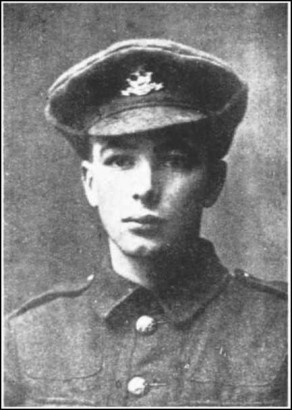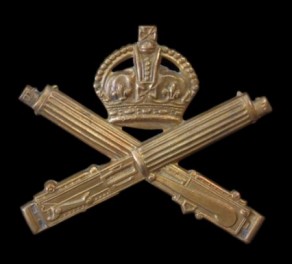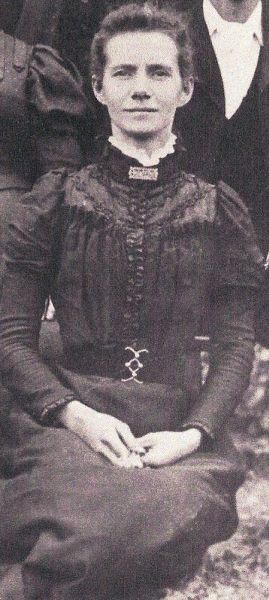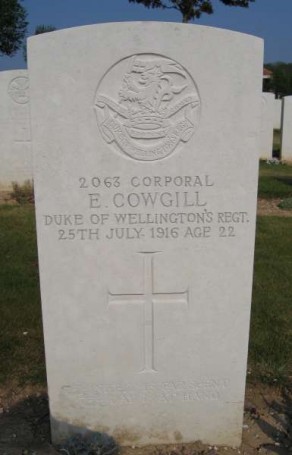Main CPGW Record
Surname: COWGILL
Forename(s): Ernest
Place of Birth: Skipton, Yorkshire
Service No: 2063
Rank: A/Corporal
Regiment / Corps / Service: Machine Gun Corps (Infantry)
Battalion / Unit: 147th Machine Gun Company
Division: 49th (West Riding) Division
Age: 22
Date of Death: 1916-07-25
Awards: ---
CWGC Grave / Memorial Reference: VII. C. 10.
CWGC Cemetery: LONSDALE CEMETERY, AUTHUILLE
CWGC Memorial: ---
Non-CWGC Burial: ---
Local War Memorial: SKIPTON, YORKSHIRE
Additional Information:
Ernest Cowgill was the son of Tom and Elizabeth Ann Cowgill, née Whitham. Tom was born at Bradford and Elizabeth at Skipton, Yorkshire. Ernest was the cousin of Private Joseph Whitham (907376) (q.v.); L/Corporal Harold Cowgill (18/1514) (q.v.) and Private Norris Cowgill (20986) (q.v.).
1901 Skipton, Yorkshire Census: 4, Primrose Hill - Ernest Cowgill, aged 7 years, born Skipton, son of Tom and Elizabeth Ann Cowgill.
1911 Skipton, Yorkshire Census: 4, Primrose Hill - Ernest Cowgill, aged 17 years, born Skipton, son of Tom and Elizabeth Ann Cowgill.
The British Army Service Record for Ernest Cowgill exists but may be incomplete.
Ernest is listed in the Nominal Roll of the 1/6th Battalion Duke of Wellington's (West Riding Regiment): Pte E. Cowgill.
British Army WW1 Medal Rolls Index Cards: A/Cpl Ernest Cowgill, 2063, W. Rid. R. Theatre of War first served in: (1) France, Date of entry therein: 14.4.15. K. in A. 25.7.16.
British Army WW1 Medal and Award Rolls: A/Cpl Ernest Cowgill, 6/2063, 1/6 W. Rid. R. K. in A. 25.7.16.
Army Registers of Soldiers' Effects: Cpl Ernest Cowgill, 2063, 1/6th Bn W. Riding. Date and Place of Death: 25.7.16. France. To whom Authorised/Amount Authorised: Father - Tom. £10 5s. 5d.
UK, WW1 Pension Ledgers and Index Cards, 1914-1923: card(s) exist for Ernest. Name(s) on card(s): Dependant: Mrs Elizabeth Ann Cowgill. Relationship: Mother. Address: 4, Primrose Hill, Skipton.
See also: ‘Guiseley Terriers: A Small Part in The Great War – A History of the 1/6th Battalion, Duke of Wellington’s (West Riding) Regiment’ by Stephen Barber (2018).
Data Source: Craven’s Part in the Great War - original CPGW book entry
View Entry in CPGW BookEntry in West Yorkshire Pioneer Illustrated War Record:
COWGILL, Cpl. Ernest, aged 22, Duke of Wellington’s, son of Mr. T. Cowgill, Primrose Hill, [Skipton], killed in action, France, July 25, 1916.
---
Click the thumbnail below to view a larger image.

A/Corporal Ernest COWGILL

Regiment / Corps / Service Badge: Machine Gun Corps (Infantry)

Divisional Sign / Service Insignia: 49th (West Riding) Division
Data from Soldiers Died in the Great War 1914 - 1919 Records
Soldiers Died Data for Soldier Records
Surname: COWGILL
Forename(s): Ernest
Born: Skipton, Yorks
Residence:
Enlisted: Skipton
Number: 2063
Rank: A/Cpl
Regiment: Duke of Wellington's (West Riding Regiment)
Battalion: 1/6th Battalion
Decorations:
Died Date: 25/07/16
Died How: Killed in action
Theatre of War: France & Flanders
Notes:
Data from Commonwealth War Graves Commission Records
CWGC Data for Soldier Records
Surname: COWGILL
Forename(s): Ernest
Country of Service: United Kingdom
Service Number: 2063
Rank: Corporal
Regiment: 1st/6th Bn. Duke of Wellington's (West Riding Regiment) attd. 147th Coy. Machine Gun Corps (Infantry)
Unit:
Age: 22
Awards:
Died Date: 25/07/1916
Additional Information: Son of Mr. and Mrs. T. Cowgill, of 4, Primrose Hill, Skipton, Yorkshire. (CWGC Headstone Personal Inscription: THE NIGHT IS FAR SPENT THE DAY IS AT HAND)
---
View Craven Herald Articles
View Craven Herald Articles

04 August 1916
COWGILL – July 25th 1916, killed in action in France. Corp. Ernest Cowgill, 1/6th Duke of Wellington’s Regiment, son of Mr. Tom Cowgill, Primrose Hill, Skipton, aged 22 years.
04 August 1916
SKIPTON'S PART IN THE GREAT ADVANCE – MORE LOCAL MEN KILLED AND WOUNDED: A PROMISING AND FEARLESS YOUNG N.C.O.
Corporal Ernest Cowgill, son of Mr. Tom Cowgill, Primrose Hill, Skipton, lost his life at the same time as Sergt. Fred Stork through the exploding of a shell in a dug-out. He died instantaneously. When the war broke out he was in camp with the Skipton Territorials, and went into serious training for the Front. He went out to France with the 1/6th Duke of Wellington’s Battalion in April, 1915. In civil life he was a weaver and in his youth was a member of the 1st Skipton Boy Scouts (under the late Lieut. Henry Brian Fisher), and the Skipton Bulldogs.
Captain Sproulin has written to the parents as follows:– “It is with deep regret that I have to inform you of the death of you son, Lance-Corp. Cowgill. He, with Sergt. Stork, of the same section, were sheltering in a dug-out during an especially fierce German bombardment when a shell burst through, killing all the occupants instantly. His loss has been a very great one to me; a more promising, keen, and fearless young N.C.O. one could not have wished for. During the whole time he has been under my command he has been all one could have wished for. I sincerely trust that the knowledge that he died bravely doing his duty to the last will be some comfort to you in your great bereavement.”
In a letter to the family Second-Lieut. J. Hunter Ward writes:– “It is with the deepest regret that I must tell you of your son’s death. He was killed by a shell bursting in a dug-out, dying instantaneously. I have just written my tribute to Sergt. Stork, who was killed at the same time. More than can be said for him I could not say for any man, but as much I can say of your son. He was a charming lad, and was cheerful and smiling in circumstances when brave men could have been pardoned for giving way. As an N.C.O. he was most willing, and his thorough knowledge of his work was second only to his interest in it. I feel that I must also pay tribute to his virtues as a man, quite apart from his splendid characteristics as an N.C.O. He was a man whom I moved to speak to, and perhaps through that and censoring his letters, I know more of his home life than I do of some of the other men, and through this I understand how much you meant to him and he to you. I feel therefore that anything I can say can lessen the pain you feel. One thing, however, that I know will please you is that he had a Christian burial attended by his officers and his comrades in the section who all feel his loss very much indeed. When circumstances permit I shall be pleased to let you know his resting place. He was killed on the 25th, about 12:30 p.m. Trusting that you will find consolation in the manner of his death, and assuring you of my profound sympathy. – (P.S.) He was probably a full Corporal at the time of his death, as I forwarded his name for promotion some time ago and expect confirmation at any time.”
Rev. Shipman, chaplain, has also written as follows:– “It is a sad task before me when I have to tell you that I buried your son this morning in company with eight other brave lads all killed yesterday. His last resting place is that of a soldier close to the firing line. A cross will shortly be put up over his grave. It is my prayer that God may help and strengthen you in this sad time.”
A COMPLIMENT FROM LIEUTENANT ROBINSON
Lieut. Ralph M. Robinson writes:– “I cannot tell you how sorry I am to hear of the death of your son Ernest, or how deeply I sympathise with you and your husband in your great loss. I had been talking to him not long before. I have never met a nicer lot of fellows than the Machine Gun Section that came out with me from Doncaster, and there was none I liked better, nor could trust more fully, than your boy. He was so quick and clever, and could turn his hand to anything. His death was quite instantaneous, so that he suffered no pain at all. He was hit by the same shell as his friend, Fred Stork, and we buried them together in the little cemetery here. Mr. Shipman, the vicar of Long Preston, took the service, and all the officers in our Machine Gun Company were present, as well as several from the 6thWest Riding. We shall all miss him very badly, and it seems hard that such a splendid fellow should have died so young. But however long he had lived he could not have had a more painless or a more glorious end.”
Corporal A. Gough writes:– “I write these few lines with deepest regret to inform you of the death of your son Ernest. He was killed yesterday with Sergt. Stork. I can assure you he was killed instantaneously and he suffered no pain whatsoever. Our section and myself will miss him very much, as he was well liked by all the lads, and by all who knew him. He was buried in a very quiet spot behind our lines, and he was buried decently. I ask you again to accept my greatest sympathy and also that of the section he was in.”
04 August 1916
"ONE OF THE BRAVEST" – Generous Tributes to the Memory of Sergt. Stork
In letters received by the families of Sergt. Stork and Corporal Ernest Cowgill, of the 1/6th Duke of Wellington’s West Riding Regiment, it appears that on Tuesday, July 25th, these two men, along with their pal, Pte. Roy Windle, were in a dugout in the front line when an enemy shell burst near them, killing Sergt. Stork and Corporal Cowgill and seriously wounding Pte. Windle, who was removed to hospital.
Sergt. Fred Stork was the son of Mr. Frank Stork; of 31, Russell Street, Skipton, and in civil life was a weaver at Messrs. Smith Hartley’s, Union Mill, Skipton. Twenty-three years of age, he was a young man of exceptional promise, and as the following letters will show, had endeared himself to both the officers and men of the Skipton Territorials, with which he had been for over three years.
In a letter to deceased’s father, Capt. W. J. M. Sproulin says:– “During a bombardment of our line yesterday afternoon he (Sergt. Stork) went round to one of the guns in the front line, and while in a dugout sheltering, a shell burst into it and killed him instantly, together with the other occupants of the dugout. His death is a very great loss to me and the remainder of the company. He was an extremely willing and gallant soldier, and had been under me since September 1913. I sincerely trust that the knowledge that he died bravely doing his duty for King and Country will be some consolation in your great bereavement.”
Lieut. Ralph M. Robinson has written as follows:– “I must write and tell you how very deeply I sympathise with you in your great sorrow. I also want you to know what a real personal loss your son’s death is to myself. In all the months we have soldiered together I never remember having had a single difference with him. He was one of the bravest, most hardworking, and most unselfish fellows I have ever met: his work in the trenches has been wonderful all through, and we shall miss him very badly. You will be glad to hear that he suffered no pain. He and his friend, Ernest Cowgill, were killed instantaneously by one shell during a bombardment yesterday. Roy Windle, who was with them, got a nasty wound, but the doctor thinks well of his chances. Mr. Shipman, of Long Preston, took the funeral this morning. All the machine gun corps officer were present, as well as several of us from the West Ridings. He was buried in a beautiful little valley between two woods with a river at the bottom, between rows of poplar trees. I know how deeply your sorrow must be at the loss of your son, but at the same time if you only knew what both the officers and men thought about him you would be the proudest father in Craven.”
A letter from Lieut. J Hunter Ward contains the following passages:– “I have no words in which to tell you how much he was valued, not only in the company, but by all the old members of the 6th Battalion. I never remember a case where more enquiries were made as to whether the news was correct or not, nor more regret expressed when the sad news was verified. During this present operation he and I worked together all the time under conditions which show men in their true colours. He was entirely fearless and fearfully keen on any possible chance of getting a gun into action and hitting the Germans. His cheerfulness in the trenches was part of his sterling qualities as a non-commissioned officer; I loved him as a brother. It is only about ten days that I wrote home telling my people it my great good fortune in having such a fearless and hardworking friend. I am sure that I can say but little to ease the pain you feel by his death, but I would like to say in conclusion that should it be fate to be killed in this campaign I could wish that I might die as your son with my face to the enemy and fearing nothing.”
Mr. Stork has also received letters from Rev. B. Shipman, Chaplain, and Corporal A. Gough, a Skipton soldier. The former says:– “It is indeed a sad affair that I have to deliver to you the news that we buried your son this morning close to the front line. A cross will shortly be placed on his grave. I had the privilege of knowing him; and was especially interested in him because I knew his uncle well – Fred Stork of Long Preston. It may help you to know that your son was very popular and was a very good soldier. His captain has said there was non better and he was a very good son. May God help and strengthen you to meet this cruel blow.”
Corporal Gough writes:– “Our section and myself will miss him very much, as he was well liked by all the lads and by all who knew him.”
04 August 1916
SKIPTON’S PART IN THE GREAT ADVANCE – MORE LOCAL MEN KILLED AND WOUNDED
It is evident from letters recently received from local men that many soldiers from Skipton are in the thick of the continued fighting in the region of the Somme, and so doing their part valiantly in the process of ‘giving the enemy no rest’ which we believe is at last awakening German apprehension to the reality and power of the British offensive. Last week-end brought further sad news for four local families, to all of whom the sympathy of Skipton people will go out. News of the death of Lieut. Henry Brian Fisher was received on Friday morning, and on Saturday word came that Pte. Thos. Cartman had died from wounds received more than a week previously. Then on Sunday letters were received stating that Sergt. Fred Stork and Corporal Ernest Cowgill had been killed in a dug-out and that Pte. G. Roy Windle had been seriously wounded in the same dug-out. Sergt. Stork, Corp. Cowgill and Pte. Cartman were old pupils of Mr. Alfred Hartley, at the Skipton Parish Church School.
27 July 1917
COWGILL – In loving memory of our dear son and brother, Corporal E. Cowgill, killed in action July 25th 1916.
“He nobly did his duty.”
His fresh young life could not be saved,
He slumbers now in a soldier’s grave.
From the sorrowing Family and Elsie, 4, Primrose Hill, Skipton.
26 July 1918
COWGILL – In loving memory of our dear son and brother, Corporal Ernest Cowgill, killed in action in France July 25th, 1916.
“He laid his richest gift on the altar of duty (his life).”
From the Family and Elsie, 4 Primrose Hill, Skipton.
25 July 1919
COWGILL – In loving memory of a dear son and brother, Cpl. E. Cowgill, killed in action July 25th, 1916.
Ever remembered by the Family and Elsie, 4 Primrose Hill, Skipton.
23 July 1920
COWGILL – In loving memory of a dear son and brother, Cpl. E. Cowgill, M.G.C., killed in action, July 25th, 1916.
“Dearer to us than words can tell
are the thoughts of him we loved so well.”
“Ever remembered.”
From all at home and Elsie, 4 Primrose Hill, Skipton.
30 July 1920
COWGILL and STORK – In loving memory of our dear chums, Cpl. E. Cowgill and Sergt. F. Stork (Skipton), of the M.G.C., killed in action in France, July 20th, 1916.
Years may wipe out many things,
But this they wipe out never;
Memories of the good old times
When we were chums together.
From Charlie, Jimmie, Dick, Arthur and Billy (Skipton).
29 July 1921
COWGILL – In loving memory of Cpl. E. Cowgill, 147th M.G.C., son of Mr. and Mrs. T. Cowgill, who was killed in action, July 25th, 1916.
“In the midst of life we are in death.”
From the Family, 4 Primrose Hill, Skipton.
View West Yorkshire Pioneer Articles
View West Yorkshire Pioneer Articles

30 April 1915
WITH THE SKIPTON TERRITORIALS IN FRANCE
Private James Garwood writes to a friend from France:– “Just a line to let you know that I am all alive and kicking. I guess by now you will have got to know that we are within sound of the guns. I don’t care much for the people in this part of France. They seem to be far too slow. Please remember me to friends at Gargrave Road (Primitive Chapel).”
Private Ernest Cowgill writes:– “None of my section have been in the trenches yet but a lot of our battalion has.”
Pte. Fred Thornton writes:– “Thanks for your promise to keep me supplied with cigarettes. They are very scarce out in France. See you don’t have the tobacconist’s name outside your parcel or they will go astray… We are billeted at present in a country farm-house, and are just becoming accustomed to the place and the people.”
04 August 1916
COWGILL – Killed in action, Lance-Corporal Ernest Cowgill, of the 1st 6th West Riding Regiment, son of Mr. and Mrs. Tom Cowgill, of Primrose Hill, Skipton, aged 22.
04 August 1916
TWO SKIPTON SOLDIERS KILLED – Splendid Tributes by Officers and Men
Lance-Corporal Ernest Cowgill, of the 1st 6th Duke of Wellington’s West Riding Regiment, and son of Mr. and Mrs. Tom Cowgill, of Primrose Hill, Skipton, lost his life at the same time as Sergeant Fred Stork through the bursting of a shell in a dug-out and died instantaneously. When war broke out he was at Marske with the Skipton Territorials, and went into training for the Front. He went out to France in April 1915 with the 1st 6th Duke of Wellington’s West Riding Regiment. He was a weaver at Messrs. Curl, Kirk and Co’s., and when he was a boy he was a member of the Skipton Bulldogs. He was 22 years of age.
Rev. R.S. Shipman, in a letter to his parents, states:– “It is a sad task before me when I have to tell you that I buried your son this morning in company with eight other brave lads all killed yesterday. His last resting place is that of a soldier close to the firing line. A cross will shortly be put up over his grave. It is my prayer that God may help and strengthen you in this sad time.”
Captain W.J.M. Sproulin writes:– “It is with deep regret that I have to inform you of the death of you son, Lance-Corporal Cowgill, who, with Sergt. Stork, of the same section, was sheltering in a dug-out during an especially fierce German bombardment when a shell burst through, killing all the occupants instantly. His loss has been a very great one to me. A more promising and fearless young N.C.O. one could not have wished for. During the whole time he has been under my command he has been all one could have wished for. I sincerely trust that the knowledge that he died bravely doing his duty to the last will be some comfort to you in your great bereavement.”
Second-Lieut. J. Hunter Ward writes:– “It is with the deepest regret that I must tell you of your son’s death. He was killed owing to a shell bursting in a dug-out, dying instantaneously. I have just paid my tribute to the memory of Sergeant Stork, who was killed at the same time. More than I have said for him I could not say for any man, but as much I can say of your son. He was a charming lad, and was cheerful and smiling in circumstances when brave men could have been pardoned for giving way. As an N.C.O. he was most willing, and his thorough knowledge of his work was second only to his interest in it. I feel that I must pay tribute to his virtues as a man. Quite apart from his splendid characteristics as an N.C.O. he was a man whom I loved to talk to, and perhaps through that, and censoring his letters, I know more of his home life than I do of some of the other men. Through this I understand how much you meant to him and he to you. I feel, therefore, that nothing I can say can lessen the pain you feel. One further thing I know will please you. He had a Christian burial attended by his officers and his comrades in the section, who all feel his loss very much indeed. His effects will be forwarded to you, and I trust you will receive them intact. When circumstances permit I shall be pleased to let you know his resting place. He was killed on July 25th, about 12:30 p.m. Trusting you will find consolation in the manner of his death, and assuring you of my profound sympathy. He was probably a full Corporal at the time of his death, as I forwarded his name for promotion some time ago and expect confirmation at any time.”
27 July 1917
COWGILL – In loving memory of our dear son and brother, Corpl. E. Cowgill, killed in action July 25th, 1916.
“He nobly did his duty.”
His fresh young life could not be saved;
He slumbers now in a soldier’s grave.
– From the sorrowing Family and Elsie, 4, Primrose Hill, Skipton.
26 July 1918
COWGILL – In loving memory of our dear son and brother, Corporal Ernest Cowgill, killed in action in France July 25th, 1916.
“He laid his richest gift on the altar of duty (his life).”
– From the Family and Elsie, 4, Primrose Hill, Skipton.
Comment on this Soldier Record
You can leave comments on this soldier record. Please note all comments will be manually approved before they appear on the website.







No comments yet.